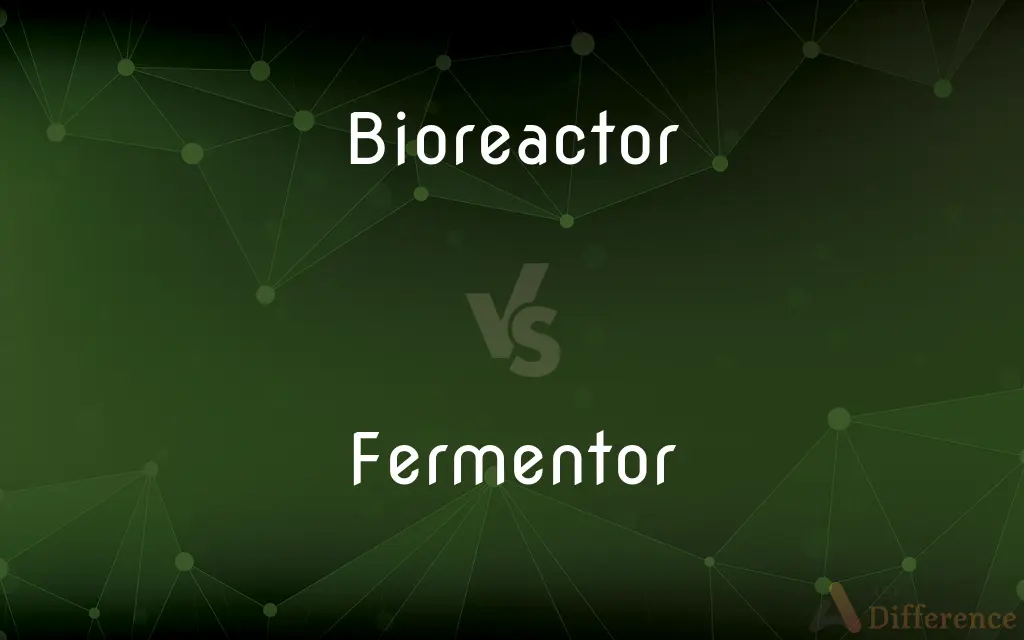Bioreactor vs. Fermentor — What's the Difference?
By Fiza Rafique & Maham Liaqat — Updated on May 8, 2024
A bioreactor is a vessel used for biologically active environments, supporting various types of bioprocesses, while a fermentor specifically refers to a bioreactor used for fermentative processes, such as brewing or antibiotic production.

Difference Between Bioreactor and Fermentor
Table of Contents
ADVERTISEMENT
Key Differences
A bioreactor is a device or system engineered to support a biologically active environment, typically used in industries like pharmaceuticals, biotechnology, and environmental engineering, whereas a fermentor is a type of bioreactor specifically designed for fermentation processes, utilized in brewing, food production, and pharmaceuticals.
Bioreactors can be designed to support the growth of a wide range of organisms, including mammalian cells, bacteria, and yeast, under controlled conditions for the production of pharmaceuticals, chemicals, or the treatment of waste, while fermentors are usually designed to optimize the growth and metabolic activity of yeast and other fermentative organisms.
The term "bioreactor" is generally broader and can include systems used for tissue engineering, cell cultures, and biochemical engineering, focusing on diverse bioprocesses beyond fermentation, such as cellular or enzymatic activities, whereas "fermentor" focuses strictly on fermentation, the anaerobic or aerobic biochemical process.
Bioreactors are often equipped with advanced control systems for regulating temperature, pH, oxygen, and nutrient levels to enhance the productivity and efficiency of bioprocesses. Fermentors, while also controlled environments, are particularly tuned for the optimal production of alcohols, acids, and other fermentation products.
In industrial and environmental applications, bioreactors can be used for the biodegradation of pollutants or energy production (like in biofuel production), showcasing a versatile utility beyond traditional fermentation, while fermentors are integral to industries relying on fermentation techniques for product development.
ADVERTISEMENT
Comparison Chart
Purpose
Supports a variety of bioprocesses
Specifically for fermentation processes
Applications
Pharmaceuticals, biotechnology, environmental engineering
Brewing, pharmaceuticals, food production
Supported Organisms
Bacteria, yeast, mammalian cells, etc.
Primarily yeast and other fermentative organisms
Process Focus
Cellular growth, biochemical reactions
Alcohol, acids, and other fermentation products
Control Systems
Advanced control of environmental conditions
Optimized for fermentation conditions
Compare with Definitions
Bioreactor
A vessel or system that maintains a biologically active environment.
The bioreactor was essential for cultivating the cells used in the new drug.
Fermentor
Optimized for the growth and metabolism of fermentative organisms.
The new fermentor improved the efficiency of yeast growth.
Bioreactor
Often part of a larger system of bioprocessing.
The bioreactor was a crucial component of the plant's waste treatment system.
Fermentor
May be designed for batch, fed-batch, or continuous operation.
The continuous operation fermentor facilitated a constant output of product.
Bioreactor
Used in various industries to grow organisms under controlled conditions.
Modern bioreactors have enhanced the efficiency of biofuel production.
Fermentor
Focuses on products like alcohol and organic acids.
The fermentor was specifically designed for high-yield lactic acid production.
Bioreactor
Can be used for both aerobic and anaerobic processes.
The versatility of the bioreactor allowed for both oxygen-rich and oxygen-free processes.
Fermentor
A specialized type of bioreactor used for fermentation processes.
The brewery upgraded its fermentor to increase beer production.
Bioreactor
Supports processes like cell culture and enzymatic reactions.
The bioreactor's design enabled precise control over the enzymatic reaction rates.
Fermentor
Integral to industries such as brewing and antibiotics.
Antibiotic production was significantly enhanced using advanced fermentors.
Bioreactor
A bioreactor refers to any manufactured device or system that supports a biologically active environment. In one case, a bioreactor is a vessel in which a chemical process is carried out which involves organisms or biochemically active substances derived from such organisms.
Fermentor
An organism that causes fermentation.
Bioreactor
An apparatus, such as a fermentation chamber, for growing organisms such as bacteria or yeast that are used in the biotechnological production of substances such as pharmaceuticals, antibodies, or vaccines, or for the bioconversion of organic waste.
Fermentor
Also fer·men·tor An apparatus that maintains optimal conditions for the growth of microorganisms, used in large-scale fermentation and in the commercial production of antibiotics and hormones.
Bioreactor
(biochemistry) A fermentation vat, containing microorganisms or biochemically active substances, used for waste recycling or for making drugs.
Fermentor
The vessel in which fermentation takes place
Bioreactor
An apparatus in which a suspension of microorganisms in a liquid are used to perform chemical reactions, as in synthesis of pharmaceutical agents or the conversion of harmful waste to less harmful substances. The reactor consists of a vessel to contain the suspension of microorganisms, plus a variety of attached devices used to control the reaction.
Common Curiosities
How do control systems differ between bioreactors and fermentors?
Bioreactor control systems are broadly designed to manage various environmental conditions, while fermentor controls are tailored specifically for optimal fermentation conditions.
Are fermentors used for anything besides brewing and food production?
Yes, fermentors are also used in pharmaceuticals to produce antibiotics and other microbial products.
What are the key safety concerns when operating a bioreactor or fermentor?
Key safety concerns include managing pressure levels, maintaining sterile conditions to prevent contamination, and handling biological hazards safely, especially in pathogen growth or genetically modified organisms.
What type of bioreactor would be used for tissue engineering?
Tissue engineering typically uses specialized bioreactors designed for cell culture and tissue growth.
What materials are typically used to construct bioreactors and fermentors?
Bioreactors and fermentors are commonly made from stainless steel, glass, or specialized polymers, depending on the scale and purpose of the process.
What is the main difference between a bioreactor and a fermentor?
A bioreactor supports various bioprocesses, while a fermentor is specifically used for fermentation.
Can all bioreactors be used for fermentation?
While many bioreactors can be adapted for fermentation, not all are optimized for this process.
How do the sizes of bioreactors and fermentors vary?
Both bioreactors and fermentors range from small laboratory-scale units to large industrial-scale systems, with fermentors often being larger to accommodate mass production processes like brewing.
Are there specific industries where bioreactors are preferred over fermentors?
Bioreactors are preferred in industries that require precise control over complex biological processes, such as in the production of biopharmaceuticals and regenerative medicines, whereas fermentors are favored in traditional fermentation industries like food and beverage.
Can bioreactors operate continuously, unlike fermentors?
Yes, bioreactors can be designed for continuous operation, which is particularly advantageous in the production of pharmaceuticals and biofuels, whereas fermentors can also operate continuously but are often used in batch or fed-batch modes in industries like brewing.
What is the impact of bioreactor and fermentor design on product yield?
The design of these systems critically affects product yield by optimizing conditions like mixing, oxygen transfer, and temperature, which directly influence the efficiency of biological processes.
What training is required to operate a bioreactor or fermentor?
Operating these systems typically requires training in biological systems, mechanical operations, and safety procedures, often specific to the type of bioreactor or fermentor and the processes it supports.
What advancements are being made in bioreactor and fermentor technology?
Recent advancements include the development of single-use bioreactors, improved sensor technology for better process control, and scalable designs that allow for more flexible production capacities.
How do environmental conditions inside bioreactors and fermentors differ?
Environmental conditions such as pH, temperature, and oxygen levels are closely monitored and controlled in both systems but may vary significantly depending on the specific organisms and processes involved; for example, anaerobic fermentors maintain conditions without oxygen.
How is waste disposal managed for bioreactors and fermentors?
Waste disposal from bioreactors and fermentors must comply with environmental regulations, focusing on neutralizing biohazardous materials and recycling by-products when possible.
Share Your Discovery

Previous Comparison
Shawl vs. Cape
Next Comparison
Localise vs. LocalizeAuthor Spotlight
Written by
Fiza RafiqueFiza Rafique is a skilled content writer at AskDifference.com, where she meticulously refines and enhances written pieces. Drawing from her vast editorial expertise, Fiza ensures clarity, accuracy, and precision in every article. Passionate about language, she continually seeks to elevate the quality of content for readers worldwide.
Co-written by
Maham Liaqat












































